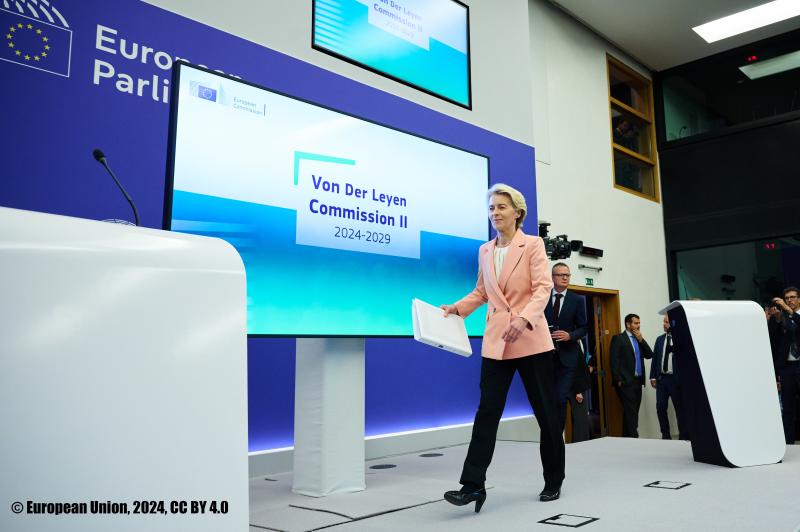Stay always informed
Interested in our articles? Get the latest information and analysis straight to your email. Sign up for our newsletter.

By Olivier Hoedeman, first published by EU Obsever.
When MEPs get the chance to grill potential commissioners next week, they need to challenge candidates on the deregulation machine EU Commission president Ursula von der Leyen has set in motion.
The commission is already rolling back previous commitments on phasing out toxic chemicals, and from combustion engine phaseouts to deforestation prevention, many other social and environmental laws are in danger.
And von der Leyen wants her second commission term to add many more tools to the deregulatory toolbox.
She is clear that the next five years' focus is on industry’s "competitiveness" – that means deregulation of EU rules that industry perceives as burdensome.
Heavily-inspired by corporate lobbying campaigns — and backed up by high-profile reports by Letta and Draghi — von der Leyen is turning EU decision-making into a deregulation machine where ambitious new social and ecological policies face so many hurdles that there’s little chance of making it through in one piece. While laws already in place are threatened by slashing enforcement and oversight.
Civil society groups and trade unions are deeply concerned. The trade union confederation ETUC denounced these plans: “Workers’ rights and collective bargaining must be protected and reinforced, not subject to deregulation attacks. In particular, we sound an alarm bell about ‘administrative burden reduction’ leading to deregulation or an inability to monitor and inspect compliance.”
These concerns are fully justified.
Corporate Europe Observatory went through Von der Leyen’s priorities for each of the candidate-commissioners (the Mission Letters).
We found over 15 different tools for systemic deregulation and slashing standards; most new, others harsher versions of existing ones.
Let’s zoom in on a handful of the most worrying components of the deregulation machine that von der Leyen intends to construct.
Firstly, all commissioners are asked to reduce corporate reporting obligations by 25 percent for all businesses (35 per cent for SMEs). These arbitrary targets are especially dangerous given reporting is absolutely crucial for these laws to work properly.
As Dutch investigative journalists Follow the Money recently revealed, civil servants stress that reporting is often crucial to meet policy objectives or necessary for audit purposes.
To imagine reporting can be cut substantially without affecting the outcome of a law is a fantasy.
Equally worrying, all commissioners are tasked with ‘stress-testing the acquis’: ie reviewing all existing EU legislation to simplify and reduce burdens on industry.
This is unprecedented and truly uncharted territory. Despite claims to the contrary, in a political context where corporate competitiveness is seen as the main priority, social and environmental standards will inevitably be lowered.
New hurdles will be added to the passage of proposed new laws, which will be checked for how they might affect 'SMEs' and 'competitiveness'.
This on top of the already very comprehensive system of impact assessments: the Commission's existing ‘Better Regulation’ toolbox is de facto deregulatory, and its the Regulatory Scrutiny Board routinely intervenes to lower social and environmental ambitions.
Von der Leyen's new mantra is wanting closer involvement of business in checking new draft legislation.
She mentions several new ways in which businesses will be consulted: ‘Implementation Dialogues’ with ‘stakeholders’ and a new consultation approach called 'Reality Checks'.
No details, but there’s every reason to fear that this will mean giving corporate lobbies an even more direct role in shaping EU legislation.
What should ring loud alarm bells in the European Parliament is the commission's demand to force the parliament and European Council to use the same kind of business-friendly impact assessments as they do.
MEPs' amendments to the commission’s draft legislation would be subject to these impact assessments.
This would be absurdly undemocratic, restrict the freedom of parliament, and force EU decision-making even further into a narrow corporate-friendly pathway. Too many good ideas already suffer 'death by impact assessment'.
Finally, von der Leyen’s deregulation machine also targets national governments, regions, and municipalities.
A new Single Market Strategy "to speed up the removal of barriers" and a possible “Single Market Barriers Prevention Act” would give the commission further powers to control national and local governments, and limit the democratic space for progressive measures.
Many policies labelled 'regulatory barriers' are in fact legitimate and valuable progressive laws and policies.
As our report 30 years of the EU Single Market shows, the commission regularly challenges national laws and policies that industry considers to be violations of the single market.
As a result of airport lobby complaints, EU infringement procedures led to the gutting of the French government’s ban on short-haul domestic flight routes (where fast trains are available).
Such decisions are often a highly pro-business and neoliberal interpretation of single market law, by commission departments that ignore for example the EU's own climate goals.
The combined effect of these planned deregulation measures and more will render it much less likely for ambitious progressive regulations to protect people and the environment to clear the decision-making process full of carefully designed hurdles.
Click here to check our guide to the Commission's 16 tools to deregulate.
That’s disastrous at a time of multi-faceted crises where a deep, socially just ecological transformation of our societies is needed.